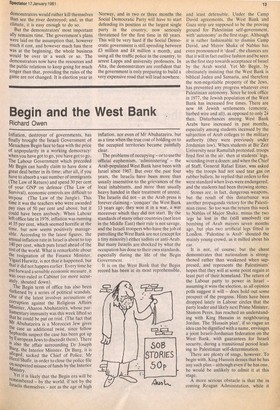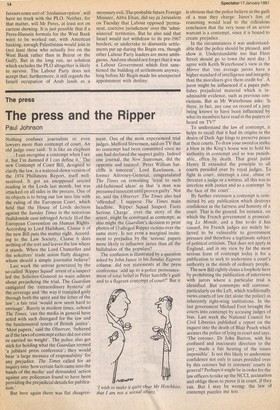Begin and the West Bank
Richard Owen
Inflation, destroyer of governments, has finally brought the Israeli Government of Menachem Begin face to face with the price of unpopularity in a working democracy: when you have got to go, you have got to go. The Labour Government which preceded Mr Begin can hardly claim to have done a great deal better in its time; after all, if you have to absorb a vast number of immigrants (The Law of Return) and spend 30 per cent of your GNP on defence (The Law of Survival), economic controls are difficult to impose (The Law of the Jungle). This time it was the teachers who were awarded pay rises of 50 per cent and above, but it could have been anybody, When Labour left office late in 1976, inflation was running at 35 per cent, which seemed horrific at the time, but now seems positively manageable. According to the latest figures, the annual inflation rate in Israel is about to top 140 per cent, which puts Israel ahead of the rest of the world. What is remarkable about the resignation of the Finance Minister, Yigael Hurwitz, is not that it happened, but that it did not happen earlier. Every time he put forward a sensible economic measure, it was over-ruled in Cabinet (or more accurately, shouted down). The Begin term of office has also been darkened by a series of political scandals. One of the latest involves accusations of corruption against the Religious Affairs Minister, Aharon Abuhatzeira, whose parliamentary immunity was this week lifted so that he could be put on trial. (The fact that Mr Abuhatzeira is a Moroccan Jew gives the case an additional twist, since fellow Sephardis suspect the case has been got up European Jews to discredit them). There also the affair surrounding Dr Joseph the Interior Minister. Dr Burg, it is alleged, sacked the Chief of Police, Mr Shafir, in order to close the police file on suspected misuse of funds by the Interior Ministry. Yet it is likely that the Begin era will be lemembered — by the world, irnot by the Israelis themselves — not as the age of high inflation, nor even of Mr Abuhatzeira, but as a time when the true cost of holding on to the occupied territories became painfully clear.
The problems of occupying — or to use the official euphemism, 'administering' — the Arab-populated West Bank have been with Israel since 1967. But over the past four years, the Israelis have been more than usually insensitive to the grievances of the local inhabitants, and more than usually heavy handed in their treatment of unrest. The Israelis did not — as the Arab press is forever claiming — 'conquer' the West Bank 13 years ago; they won it in a war, a war moreover which they did not start, By the standards of many other countries (not least in the Middle East) their rule is not savage, and the Israeli troopers who have the job ot patrolling the West Bank are not (except for a tiny minority) either sadists or anti-Arab. But many Israelis are shocked by what the occupation has done to their own standards, especially (hiring the life of the Begin Government.
It is on the West Bank that the Begin record has been at its most reprehensible, and least defensible. Under the Camp David agreements, the West Bank and Gaza strip are supposed to be the proving ground for Palestinian self-government, with 'autonomy' as the first stage. Although it is rather fashionable to dismiss Camp David, and Mayor Shaka of Nablus has even pronounced it 'dead' ,,the chances are that it will in fact outlive fashion and be seen as the first step towards acceptance of Israel by the Arab world. Yet Mr Begin, by obstinately insisting that the West Bank is biblical Judea and Samaria, and therefore the non-negotiable property of the Jews, has prevented any progress whatever over Palestinian autonomy. Since he took office in 1977, the Jewish population of the West Bank has increased five times. There are now 68 Jewish settlements (concrete. barbed wire and all), as opposed to only 24 then, Disturbances among West Bank Arabs have increased in past months, especially among students incensed by the subjection of Arab colleges to the military authority (they were previously under Jordanian law). When students at Bir Zeit University near Riunallah protested, troops fired first in the air, then at students' legs, wounding over a dozen; and when the Chief of Staff, General Rafael Eitan, was asked why the troops had not used tear gas on rubber bullets, he replied that orders to fire were standard when lives were endangered, and the students had been throwing stones.
Stones are, in fact, dangerous weapons, but the result of this disturbance was another propaganda victory for the Palestinian cause. So too was the return this week to Nablus of Major Shaka, minus the two legs he lost in the (still unsolved) car bombing of Arab mayors seven months ago, but plus two artificial legs fitted in Lonaon. 'Palestine is Arab' shoutedthe mainly young crowd, as it milled about his car.
It is not, of course; but the chant demonstrates that nationalism is strengthened rather than weakened when suppresed, and represents the Palestinians' hopes that they will at some point regain at least part of their homeland. The return of the Labour party to power in Israel — assuming it wins the election, as all opinion polls suggest it will — does hold out some prospect of the progress. Hints have been dropped lately in Labour circles that the party leader and likely next Prime Minister, Shimon Peres, has reached an understanding with King Hussein in neighbouring Jordan. The 'Hussein plan', if so vague an idea can be dignified with a name, envisages a joint Israeli-Jordanian federation on the West Bank, with guarantees for Israeli security, during a transitional period leading to Palestinian self-determination.
There are plenty of snags, however. To begin with, King Hussein denies that he has any such plan — although even if he has one, he would be unlikely to admit it at this stage.
A more serious obstacle is that the in coming Reagan Administation„ while it favours some sort of 'Jordanian option', will have no truck with the PLO. Neither, for that matter, will Mr Peres, at least not on current showing. It is just possible that if a Peres-Hussein formula for the West Bank were to be worked out, with American backing, enough Palestinians would join in (not least those who actually live on the West Bank rather than in Beirut or the Gulf). But in the long run, no solution which excludes the PLO altogether is likely to survive. The Labour Party does not accept that; furthermore, it still regards the Israeli occupation of Arab lands as a necessary evil. The probable future Foreign Minister, Abba Eban, did say ,in Jerusalem on Tuesday that Labour opposed 'permanent, coercive jurisdiction' over the 'administered' territories. But he also said that Israel would not withdraw to its pre-1967 borders, or undertake to dismantle settlements put up during the Begin era, though other Labour Party leaders are more ambiguous. And one should not forget that it was a Labour Government which first sanctioned the building of settlements anyway, long before Mr Begin made his unexpected appointment with destiny.



































 Previous page
Previous page